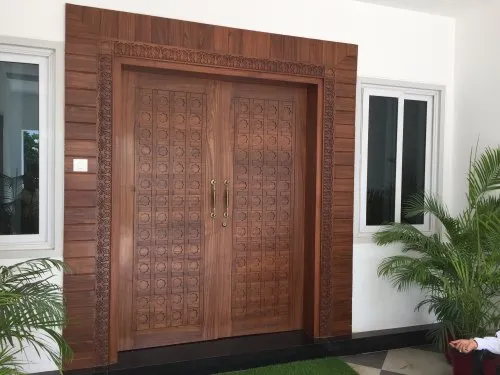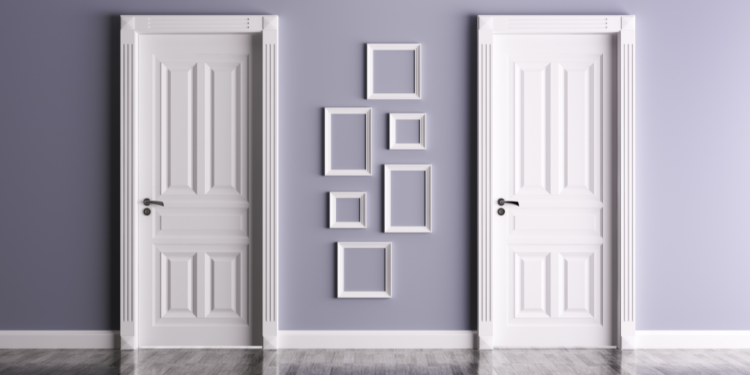Should you buy steel door frames or wood? It’s a more common question than you would think, and it involves an often forgotten aspect of any entrance or exit–the door frame. Look at a door frame near you and ask yourself, “what is it made of?” While the door is likely made of wood, a metal door frame offers security, soundproofing, durability, and fire and pest resistance that cannot be matched by timber.
Are steel doors better than wood?
When comparing steel to timber, there are many reasons to choose a steel door frame over wood. It’s important to consider what’s most appropriate for you and your project, as well as your budget.
Strength
Because steel is isotropic, meaning it has the same strength throughout, it has a higher strength-to-weight ratio than timber, which is anisotropic. Its density and strength can vary from one spot to another, making it much weaker. This also supports the durability of steel doors, which we’ll touch on next.
Durability
Moreover, these isotropic properties make metal framing stiffer and more rigid than equivalent timber frames. Timber is prone to twisting, warping, shrinking and buckling. Steel, on the other hand, does not. While some may prefer wood for its flexibility, CAD drafting and steel manufacturing have enabled more versatility in steel construction.
However, it’s important to note that steel itself if prone to its own set of weatherproofing requirements. When dealing with any sort of metal applications, rust is arguably the top of anyones mind. Galvanised steel doors and frames are available on the market to alleviate this concern.
Resistance
Steel is also termite-proof, offers far better heat and fire resistance than timber can, and is 100% recyclable since it does not require treatment against pests and hazards. And in coastal and corrosive environments, especially those near industrial zones, steel coatings and galvanising ensure long-term durability. External door frames, for example, are especially prone to environmental stressors like moisture. Although timber has been used for thousands of years, it’s just not as durable as steel.
If you’ve ever heard of the three little pigs, you know how the hierarchy goes–straw, sticks, bricks. We’d put money on the fourth being steel.
ZINCANNEAL® Steel
A popular steel choice for automotive and manufacturing segments is BlueScope ZINCANNEAL® steel. Alongside door frames and acoustic ceiling tiles, ZINCANNEAL® steel is commonly used in applications requiring forming and moderate drawing.
Available in G2S steel grade, a hot-dipped zinc/iron alloy-coated commercial forming steel with a skin-passed smooth matte surface suitable for direct-on painting, the thickness of ZINCANNEAL® steel ranges from 0.5mm and 2.4mm with a ZF100 standard coating class or ZF80 coating class.
Metal Door Frames
Compatible with brick, block, drywall, AFS, Dincel and a range of other applications, metal door frames are an ideal choice for houses, apartments and commercial buildings. Available in various metal thicknesses, types and sizes, metal door frames are made to order and can be supplied individually or in bulk. Plus, thanks to advances in CAD technology, metal door frames can also be custom-made to order.
Fire-Rating
Pressed metal door frames are available in various sizes in fire-rated and non-fire-rated profiles. With a two-hour fire rating, fire-rated metal door frames are manufactured to AS1905.1 2005: Components for the protection of openings in fire-resistant walls, Part 1: Fire-resistant door sets. The standard specifies how metal door frames must be installed to “protect openings in walls and partitions that are required to resist the passage of fire.”
And as we mentioned before, only steel doors are fire resistant. Moreover, gaps between the wall and the door frame are backfilled with fire-resistant material.

Sound-Proofing and Acoustics
However, probably the most exciting application for metal door frames is for acoustic applications. The isotropic properties of steel and the increased strength-to-weight ratio allow steel to reflect sound waves. Although high-density timber can naturally block soundwaves, it falls short of steel in soundproofing and acoustics for external and internal door frames.
Is a Steel Door Frame Better Than Wood?
Installing a metal door frame offers security, soundproofing, durability, and fire and pest resistance that cannot be matched by timber. If you’re worried about the big bad wolf or just want the best door frame for your home, office or commercial building, then a metal door frame is the ideal choice.





